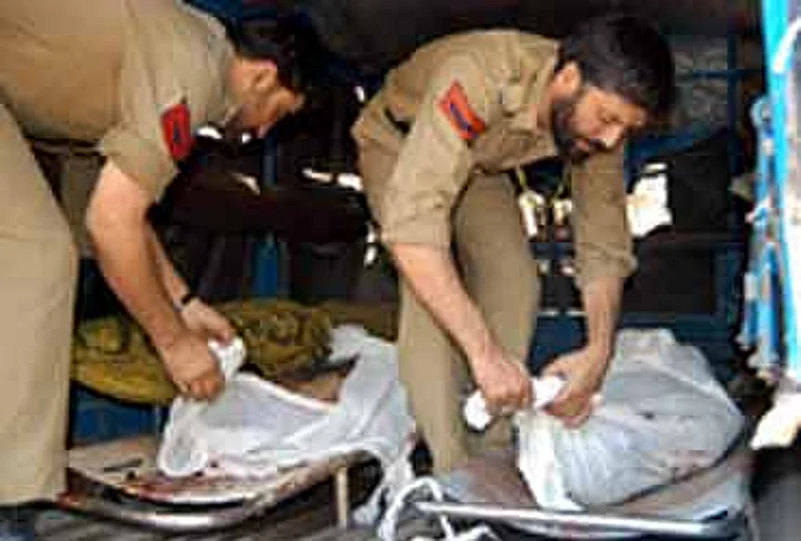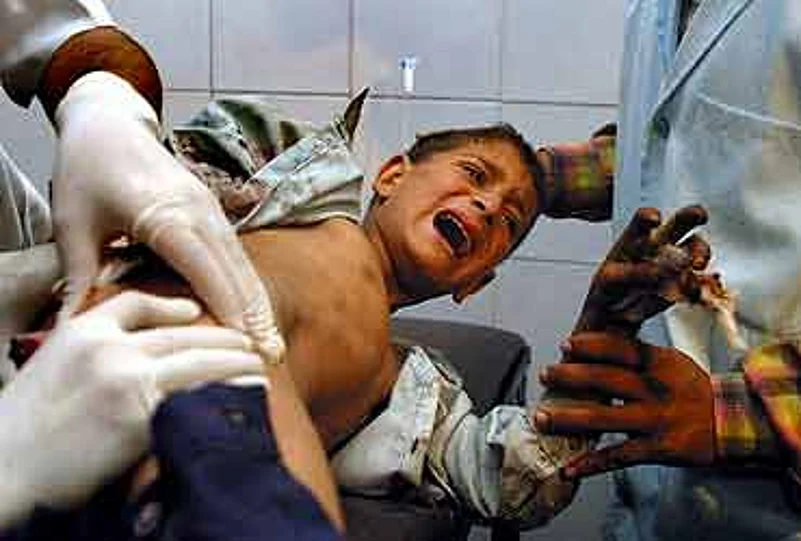Pakistan's Foreign Secretary Riaz Khokhar was in New Delhi for the"Composite Dialogue Process" between India and Pakistan during theweekend commencing June 26. The last round of talks between the ForeignSecretaries, in 1998, had been anything but cordial. When India's then ForeignSecretary K. Raghunath referred to the growing terrorist violence in Jammu andKashmir by the Pakistani jihadi group Lashkar-e-Taiba (LeT), his Pakistanicounterpart Shamshad Ahmad claimed that he was not even aware of the existenceof such an organization in his country. This assertion came despite the factthat the then Governor of Punjab, Shahid Hamid, and the then InformationMinister, Mushahid Hussain, had paid a highly publicized visit to theHeadquarters of the LeT at Muridhke near Lahore.
Advertisement
Much water has since flowed through the Ganga and the Indus. The LeT hasproclaimed its intention to plant the green flag of Islam in Washington, TelAviv and Delhi. Its cadres have been apprehended while preparing for acts ofterrorism in places as far away as Washington and Sydney. It has made no secretof its support for the Taliban and Al Qaeda and was belatedly declared aterrorist organization by the Americans, British and others.
General Pervez Musharraf reacted predictably to Western actions declaringPakistani jihadi groups like the Jaish-e-Mohammed (JeM) and the LeT as terroristorganizations. He pretended to act against these groups, but allowed them tofunction under new names. He, however, acted firmly against elements in groupslike the Harkat-ul-Mujahideen (HM), who were involved in plots against himpersonally, or joined the Al Qaeda in its moves to unseat the royalty in SaudiArabia. The LeT functions under its new name - Jamaat ud Dawa - in Pakistan. Itscadres now carry arms more discreetly than in the past. And its communicationnetworks actively give instructions to hundreds of its operatives, who have beeninfiltrated across the Line of Control (LoC) in J&K.
Advertisement
More importantly, the LeT has evidently been assisted and tasked by the InterServices Intelligence (ISI) to carry out terrorist strikes all across India,targeting both strategic installations like the Bombay Stock Exchange andpolitical leaders who are accused of abetting communal violence. The politicalobjective of such moves is clear. By targeting political leaders, the LeT isaiming to incite communal violence and create a deep communal divide withinIndia. This is similar to earlier ISI attempts to create a Hindu-Sikh divide inPunjab by targeting innocent Hindus in the state. The indictment of cadres ofthe LeT in last year's bomb blasts in Mumbai and the recent gunning down of itscadres in Gujarat has confirmed the role the Lashkar intends to undertake acrossIndia.
What makes the Lashkar different from other ISI backed terrorist groupsoperating in India? While other groups have confined their activities towresting the Kashmir valley from India and occasionally pretending to bechampions of Muslims in India, the LeT avers that its objective is theliberation of Muslims in India by the destabilization and unraveling of theIndian Union. Hence its determination to establish its presence all acrossIndia, from Kashmir to Kerala.

On June 29, the day after the talks between the Foreign Secretaries of Indiaand Pakistan ended, Kashmir's police chief Gopal Sharma made some veryinteresting disclosures. Sharma indicated that his force had broken up a complexLeT network in the State. Two of its top leaders, both Pakistani nationals, hadbeen gunned down. Twenty of its cadres had been arrested. Sharma also disclosedthat the group was planning to eliminate politically high profile persons andsome police officers. They were even planning to destroy economic centres likethe Bombay Stock Exchange and concentrate their activities in Mumbai, Delhi,Pune and Srinagar.He added that the group was acting under the directions ofthe LeT leadership based in Pakistan and that it had amongst others, killedMoulvi Mushtaq Ahmed, the uncle of prominent All Parties Hurriyat Conference (APHC)leader Mirwaiz Umar Farooq. It was also revealed that the LeT group was in closetouch with its associates and Indian contacts, who were killed recently by theGujarat Police. The LeT makes no secret that its cadres do indeed operate notonly across the LoC but also elsewhere within India. A large number of LeTleaders and cadres, who are Pakistani nationals, have been killed in recentyears in anti-terrorist operations within J&K.
Advertisement

Despite much talk of a fall in infiltration across the LoC in J&K,terrorists did strike on a number of occasions just before the compositedialogue with Pakistan commenced. These attacks included the killing of fourIndian tourists on June 12, the brutal murder of an Indian Railway engineer andhis brother on June 25, and the gunning down of 11 members of the Gujjarcommunity, including women and children in the Jammu region on June 26. Theyfollow careful targeting across J&K of candidates and others taking anactive part in the general elections in April-May 2004.
The ISI strategy in J&K is clear. They will use terrorist violence todisrupt political and economic life across the State. At the same time, theywill target political activists who seek to distance themselves from Pakistan'sambitions, either by attacking them directly, or by killing their closerelatives and associates. The assassinations of Abdul Ghani Lone and MoulviMushtaq Ahmed are a part of this strategy. It is significant that not a singleleader of the APHC or the ruling People's Democratic Party in J&K has yetissued a single statement categorically condemning acts of terrorist violenceand pointing out that Pakistani nationals involved in such activities have nobusiness to enter the state. More importantly, a message has been sent acrossthe Valley by the terrorists that they will not hesitate to target tourists andothers who provide employment and earnings for the people of the State.
Advertisement
Gopal Sharma also made another interesting revelation. He indicated that thepredominantly Pakistani LeT was now working in close coordination with thelargest Kashmiri group operating in Jammu and Kashmir, the Hizb-ul-Mujahideen(HM). Both the Hizb and the LeT are associated with the ISI-sponsored UnitedJihad Council that operates out of Muzaffrabad. The ISI evidently realized thatthe Punjabi speaking cadres of the LeT were no longer welcome in the Kashmirvalley. They are, therefore, endeavoring to ensure that they receive a measureof support by coordinating their activities with the cadres of the Hizb, whohave widespread local contacts.
The ISI establishment has also been concerned by the split in the Hurriyat.They are uncomfortable with exclusively supporting the faction led by Syed AliShah Geelani. Hence the frantic efforts of Foreign Secretary Riaz Khokhar topersuade separatist leaders and groups to close ranks during his meetings withthem in New Delhi. The effort will be to coax the various factions of theHurriyat to fall in line through a judicious mix of fear and incentives.
Advertisement
Security agencies in India have estimated that there are around 2,500-3,500armed terrorists operating in J&K. Roughly sixty percent of these terroristsare estimated to be Pakistani nationals. With hundreds of trained terroristshaving moved to staging areas for infiltration across the LoC, it should beevident that Pakistan has no intention of ending its use of violence andterrorism as instruments of state policy.
It is interesting that on the very day that that Foreign Secretary Khokharwas meeting the Prime Minister and other leaders in Delhi two important securityrelated meetings took place in Islamabad and New Delhi. Prime Minister ManmohanSingh and his colleagues in the Cabinet Committee on Security received adetailed briefing on the security situation from the Army Chief, General NirmalVij, the same day. General Musharraf also addressed a meeting of his senior Armycolleagues, including the Pakistan Army's Nine Corps Commanders on June 28. Themain focus of this meeting was on the situation on Pakistan's western borderswith Afghanistan, though the situation on the LoC and the internal situation,including the attacks on General Musharraf and the Karachi Corps Commander alsofigured in the discussions.
Advertisement
General Musharraf now has his hands full, with his Army and Air Forceattacking and laying siege on their own countrymen in North and South Waziristan,along the Pak-Afghan border. General Musharraf has little choice in this matteras George Bush desperately needs to "get" Osama bin Laden before theUS Presidential elections. The meeting of the Corps Commanders took place justbefore a visit to Pakistan by the American CENTCOM Chief General John Abizaid.The United States obviously wants General Musharraf to devote full attention tothe operations against the Al Qaeda and not fritter away his energies ontensions with India. General Musharraf has little choice but to fall in line, inmuch the same manner as General Zia was all milk and honey and even proposed a"No War Pact" with India, when the US commenced its jihad against theSoviet Union in Afghanistan. Hence the sweet talk and soft approach of MrKhokhar.
Advertisement
New Delhi obviously has to embark on a process that enhances cooperation,builds confidence and seeks to resolve differences with Pakistan. But it woulddo well to remember that even as it treaded softly on issues like Pakistan'smembership of the ASEAN Regional Forum (ARF) and its readmission to theCommonwealth, the Musharraf dispensation spared no effort to fulfill itsambitions on the Kashmir issue at the Organization of the Islamic Conference (OIC)Foreign Minister's Conference in Istanbul.
The vicious propaganda against India on the State run Pakistan television andradio continues. But far more dangerous than all this is the ISI supportedeffort by the LeT to exacerbate communal tensions and target political leadersand economic centres across India. Has any thought been given to how the costsfor Pakistan can be raised, if it persists with these efforts?
Advertisement
G. Parthasarathy is a former Indian High Commissioner to Pakistan. Courtesy,the South Asia Intelligence Review of the South Asia Terrorism Portal



















